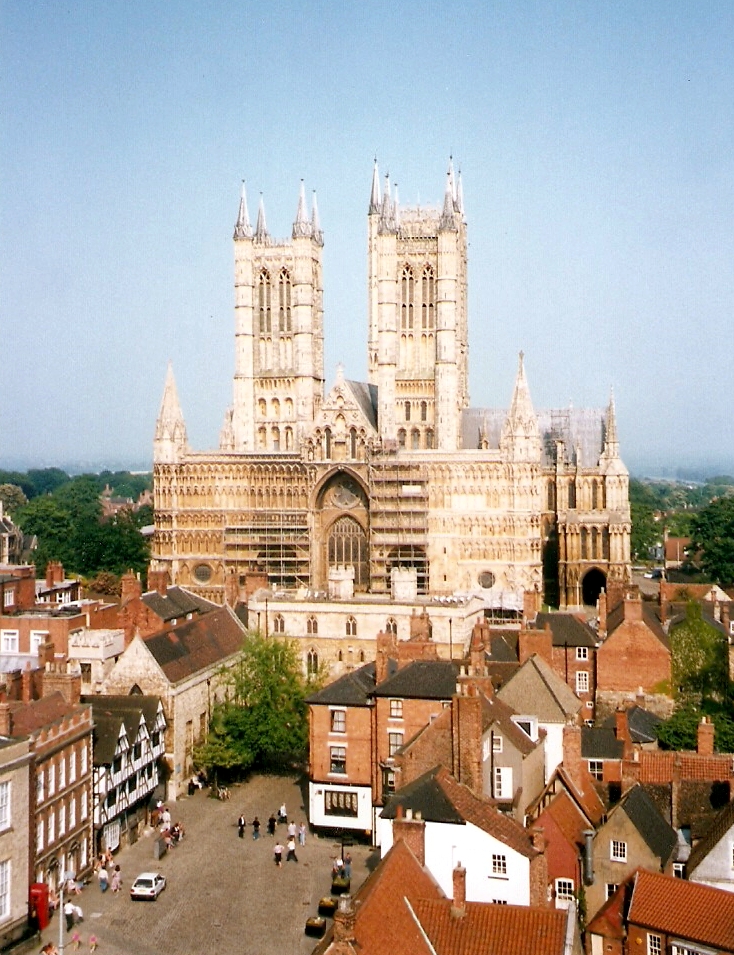
Alexander of Lincoln
Alexander of Lincoln (died February 1148) was a medieval English Bishop of Lincoln, a member of an important administrative and ecclesiastical family. He was the nephew of Roger of Salisbury, a Bishop of Salisbury and Chancellor of England under King Henry I, and he was also related to Nigel, Bishop of Ely. Educated at Laon, Alexander served in his uncle's diocese as an archdeacon in the early 1120s. Unlike his relatives, he held no office in the government before his appointment as Bishop of Lincoln in 1123. Alexander became a frequent visitor to King Henry's court after his appointment to the episcopate, often witnessing royal documents, and he served as a royal justice in Lincolnshire.
Not to be confused with Lincoln Alexander.
Alexander of Lincoln
Although Alexander was known for his ostentatious and luxurious lifestyle, he founded a number of religious houses in his diocese and was an active builder and literary patron. He also attended church councils and reorganised his diocese by increasing the number of archdeaconries and setting up prebends to support his cathedral clergy. Under Henry's successor, King Stephen, Alexander was caught up in the fall from favour of his family, and was imprisoned together with his uncle Roger in 1139. He subsequently briefly supported Stephen's rival, Matilda, but by the late 1140s Alexander was once again working with Stephen. He spent much of the late 1140s at the papal court in Rome, but died in England in early 1148. During his episcopate he began the rebuilding of his cathedral, which had been destroyed by fire. Alexander was the patron of medieval chroniclers Henry of Huntingdon and Geoffrey of Monmouth, and also served as an ecclesiastical patron of the medieval hermit Christina of Markyate and Gilbert of Sempringham, founder of the Gilbertines.
Bishop[edit]
Alexander was nominated to the see of Lincoln in April 1123 and was consecrated bishop on 22 July 1123,[10] at a ceremony held in Canterbury.[1] He owed his appointment to his uncle's influence with King Henry I; the Peterborough version of the Anglo-Saxon Chronicle noted that Alexander's appointment to the episcopate was done entirely for the love of Roger.[11]
During his time as bishop Alexander secured the submission of St Albans Abbey to his diocese[12] and founded a number of monasteries, including Haverholme Priory (a Gilbertine house),[1] Dorchester on Thames (an Arrouaisian Order house), Louth Park, and Thame;[13] Louth was one of the first Cistercian houses founded in England,[14] and Dorchester was the refoundation of a former collegiate church.[15] During Alexander's episcopate 13 Cistercian abbeys and seven nunneries were founded in his diocese. Alexander himself consecrated the church at Markyate used by the medieval mystic Christina of Markyate and her nuns, and it was he who consecrated her as a hermit at St Albans Abbey. Alexander also founded a hospital for lepers at Newark-on-Trent.[16]
Although Alexander was a frequent witness to royal charters and documents, there is no evidence that he held an official government position after his appointment as bishop, unlike his relatives Roger and Nigel.[3] Nevertheless, Alexander subsequently appears to have become a regular presence at the royal court. He frequently attested royal charters after 1123, and probably acted as a royal justice in Lincolnshire and the town of Lincoln.[9] He also held the royal castles at Newark, Sleaford and Banbury,[17] and gave confirmations of grants to the church at Godstow.[18]
Alexander was probably at the 1125 church council held at Westminster by the papal legate John of Crema, and shortly afterwards accompanied the legate on his journey back to Rome.[3] He was still in Rome in 1126, and may have helped to obtain a papal confirmation of his uncle's possession of Malmesbury Abbey, Abbotsbury Abbey, and Horton.[19] At some point during his episcopate, an eighth archdeaconry was established in his diocese, for the West Riding area of Lindsey.[20] Besides these reorganisations, Alexander had a number of clerics in his personal household, including Gilbert of Sempringham, who later founded the Gilbertine order. Other members of the bishop's household were Ralph Gubion, who became abbot of St Albans, and an Italian Bible scholar named Guido or Wido, who taught that subject while serving Alexander.[3]
Alexander presided over the organisation of his diocese into prebends to support the cathedral clergy; he established at least one new prebend and augmented two others. He also attended the church councils in 1127 and 1129 that were convened by William de Corbeil, the Archbishop of Canterbury. Later, during 1133 and 1134, he and the archbishop quarrelled, but the exact nature of their dispute is unknown. William and Alexander travelled to Normandy in 1134 to seek out King Henry to settle their dispute.[3]
Death[edit]
Alexander spent most of 1145 and 1146 at the papal court in Rome,[3] although some time during that period he was in England as one of the witnesses to the peace accord signed between the earls of Chester and Leicester.[53] He returned to the papal court, then at Auxerre, in 1147, but he was back in England by the time of his death the following year. Henry of Huntingdon says that Alexander picked up his last illness while travelling.[3] Alexander died in February 1148,[10] probably on the 20th, as that was the date on which his death was commemorated at Lincoln Cathedral,[3] and he was buried at Lincoln on 25 February 1148.[1] No tomb remains, but 12th-century documents record that Alexander left the cathedral a number of books, mostly biblical works.[3]